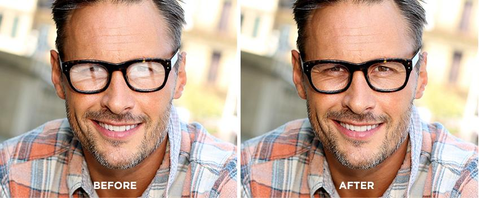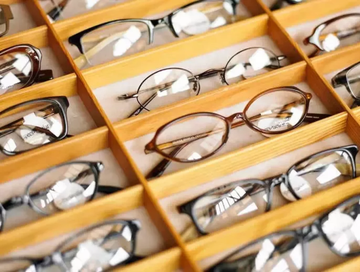
In daily life, glasses are not only visual aids, but also a symbol of fashion. However, ordinary glasses lenses often reflect light, which not only affects the appearance but also may affect the clarity of vision. Anti-reflective coating (AR coating) came into being and became an important part of modern glasses.
What is anti-reflective coating?
Anti-reflective coating (AR coating) is a transparent film applied to the surface of glasses lenses to reduce light reflection. It works by blocking part of the reflected light through the interference effect, so that more light can pass through the lens and make the field of vision clearer. AR coating is widely used in various types of glasses, including myopia glasses, sunglasses and goggles.
Advantages of anti-reflective coating
- Improve light transmittance: Anti-reflective coating can increase the light transmittance of the lens to more than 98%, ensuring that you can get a clearer visual experience.
- Reduce glare: AR coating can effectively reduce the glare caused by light reflection, especially in strong light environments, such as when driving, which can significantly improve safety.
- Improve appearance: The reflection of the lens is reduced, making the glasses more beautiful, and the wearer's eyes are more visible, enhancing communication with others.
- Reduce eye fatigue: Reducing reflected light can help reduce eye fatigue caused by long-term use of glasses.
- Protect lenses: High-quality anti-reflective coatings are usually also scratch-resistant, oil-resistant and water-resistant, further extending the life of the lenses.
How does anti-reflective coating work?
Anti-reflective coating works based on the interference of light. When light passes through the lens, part of the light is reflected by the lens surface, while the other part passes through the lens. AR coatings add multiple layers of thin films to the surface of the lens. The thickness and refractive index of these films are precisely designed so that the reflected light interferes with each other between the different layers, thereby reducing the intensity of the reflected light.
This interference effect allows most of the light to pass through the lens smoothly, while reducing the interference of reflected light, achieving improved visual effects.
How to care for glasses with anti-reflective coatings
While anti-reflective coatings improve the performance of glasses, proper care is also crucial to extend their life. Here are some care tips:
- Use professional cleaners: Choose cleaners designed for glasses and avoid products containing alcohol or strong acidic ingredients, which may damage the coating.
- Soft cleaning cloth: Use a microfiber cloth to clean the lenses, and avoid using paper towels or other rough materials to prevent scratches.
- Regular cleaning: Keep the lenses clean to avoid the accumulation of dirt and grease that affect light transmittance.
- Avoid high temperature environments: Try not to leave your glasses in high-temperature places, such as in a car, as this may damage the coating.
- Proper storage: When not wearing your glasses, be sure to put them in a dedicated glasses case to avoid scratches and collisions.
Precautions when choosing a reflective protective coating
- Coating quality
There are many different qualities of AR coatings on the market. Choosing products from professional optical shops with good quality can ensure the durability and effect of the coating. Fondvue professional eyewear brand is committed to providing the public with a variety of reasonably priced and high-quality glasses, and has high-quality anti-reflective coating technology. If you have a need for glasses, you may consider Fondvue.
- Applicable environment
If you work under extreme lighting conditions (such as outdoors, in a strong sunny environment), it is recommended to choose a more advanced coating for better anti-glare effect.
- Care and Maintenance
Although the anti-reflective coating is abrasion-resistant, you still need to use a soft cloth when cleaning the lenses and avoid using chemical cleaners to avoid damaging the coating.
- Suiting for individual needs
Different people have different needs for coatings. Consider your lifestyle, work environment and personal preferences to choose the coating that suits you best.




